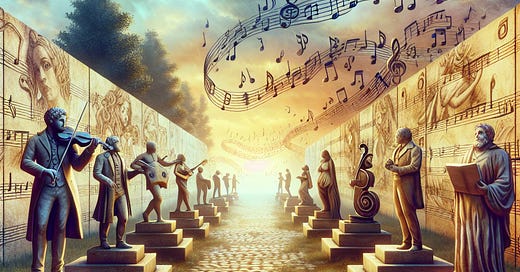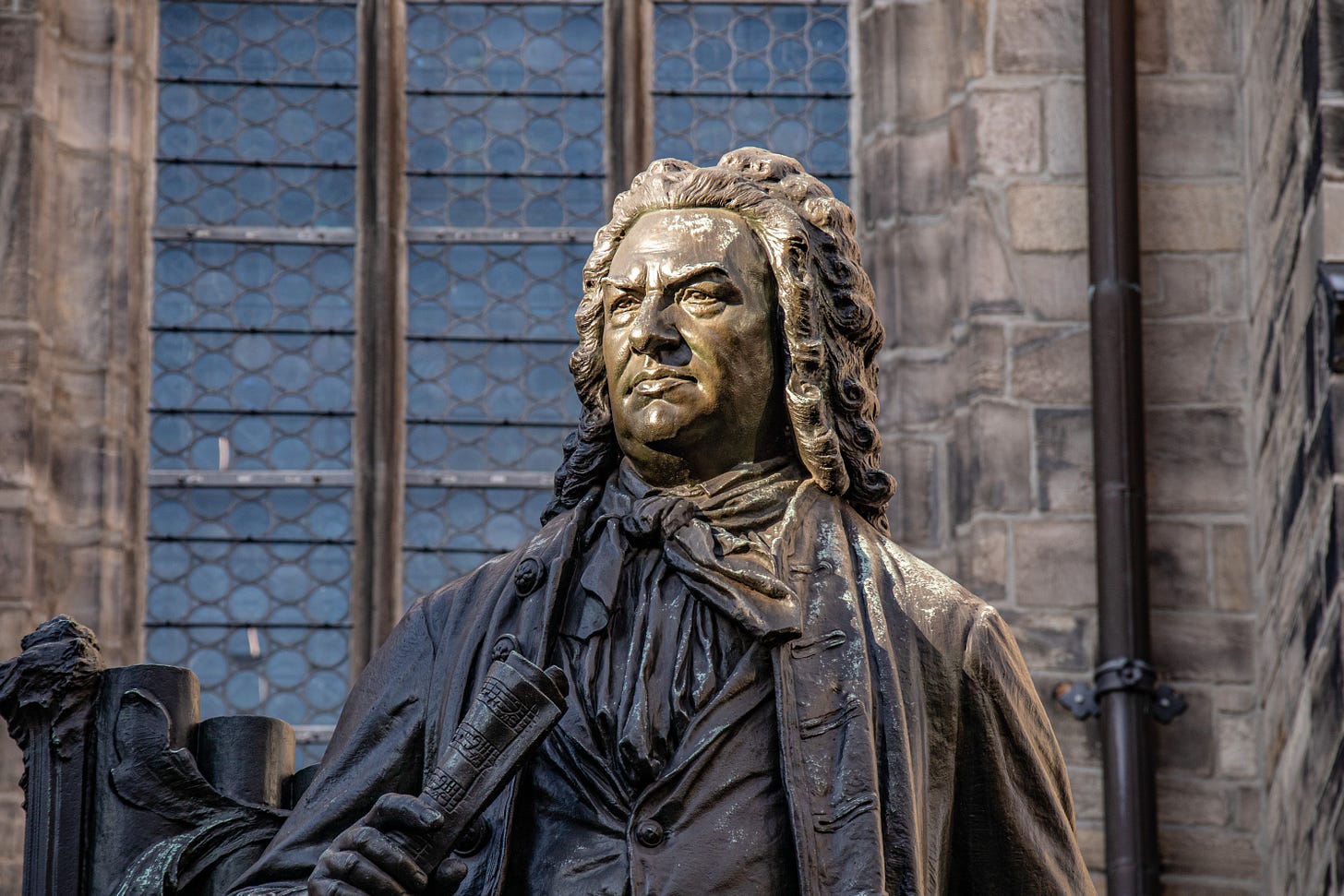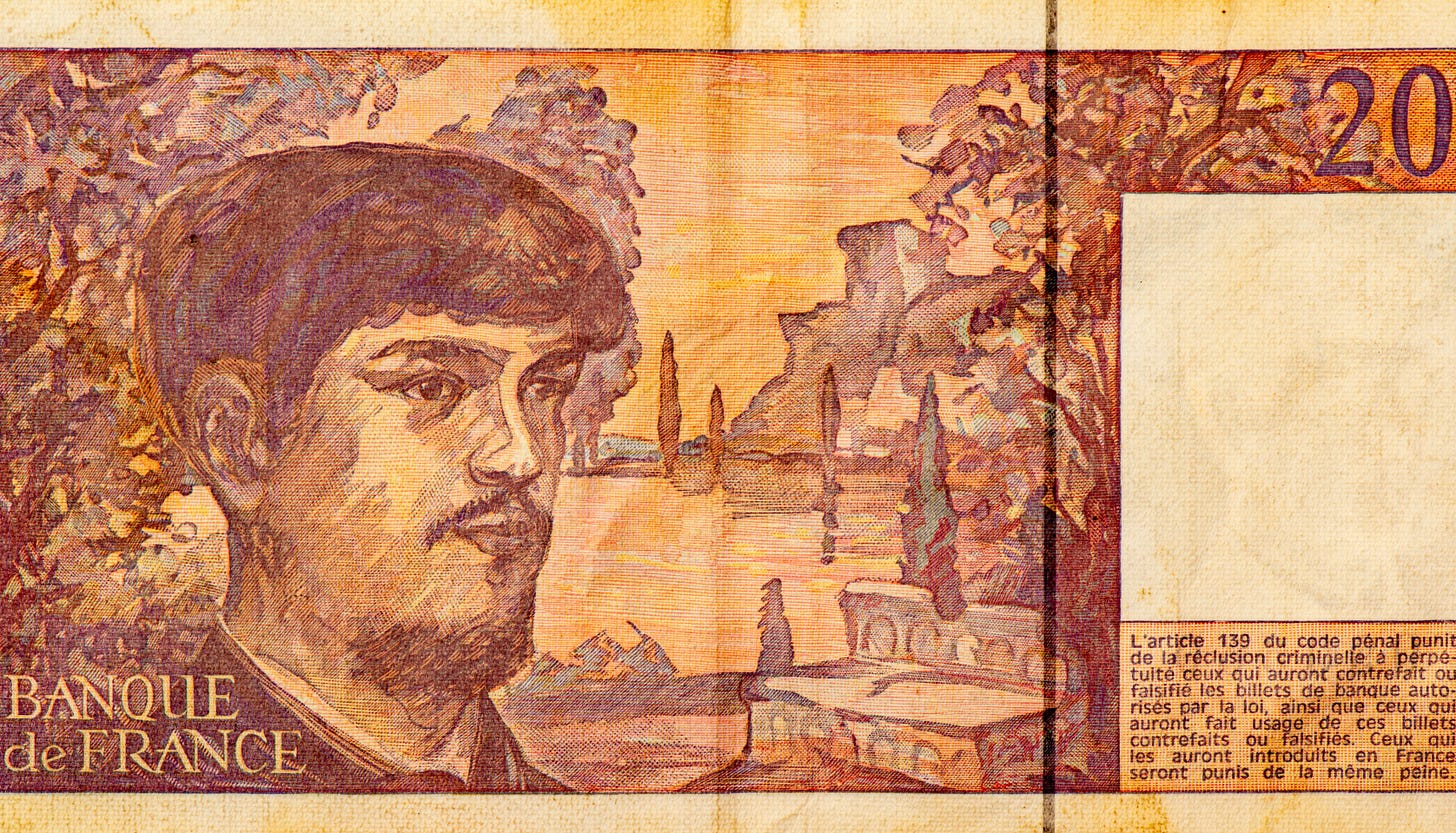For centuries, music was the crowning achievement of European civilisation. In ‘The Curtain’, novelist Milan Kundera argued that from the seventeenth till the early twentieth centuries, music gave Central Europe its ‘matchless strength’, from Liszt to Schoenberg, from Haydn to Bartók.
The whole concept of a great composer is a European invention. The indigenous Blackfoot people of Canada did not consider music to be of human origin. They told of how the king of the beavers visited a hunter who had collected the skins of every animal and bird. The beaver king was said to exchange the skin for a song with supernatural powers, and music came not from a musician but a ‘song catcher’.
The study of European music has tended to concur with the Great Man Theory of history. Like literary figures Dante and Shakespeare, who TS Eliot described as ‘men we cannot hope to emulate,’ the Western musical tradition is credited to giants whose names have echoed down the centuries.
The Western Art tradition, popularly known as ‘classical’ music, fragmented in the early twentieth century, and it is now considered by many to be elitist. But here are five pieces of high-brow music that anyone can adore.
‘Suite IV BWV 1006a’ by Johann Sebastian Bach
Johann Sebastian Bach was a church organist and Lutheran who once wrote that ‘The final aim and reason of all music is nothing other than the glorification of God.’ In life and in music, he was motivated by a sense of closeness to the Almighty and an earnest fear of Hell.
Bach has been described as an ocean into which earlier music flowed. His work adsorbed traditions including the polyphonic mastery of Renaissance composers; the Baroque style of North German organists; French dance forms; and the Italian concerto style of his contemporary Vivaldi.
For almost a century after his death, Bach’s work lay largely forgotten until it was rediscovered by German composer Felix Mendelssohn. Many of his masterpieces are an acquired taste, but the suite in E Major BWV 1006a is a joyful piece, from its fast-moving Prelude to the virtuosic Gigue. It was written for lute, but has also been recorded for piano, orchestra, and guitar.
When I was 19, the prelude alone took me some six months to learn to play on guitar. It was worth it. It is also used as an orchestral piece in Bach’s BWV 29 ‘Wir Danken Dir Gott’.
‘Eine Kleine Nachtmusik: Second Movement’ by Wolfgang Amadeus Mozart
Mozart composed in an era that prided itself on its logic and its emotional restraint. When he emerged as a major musical force, the greatest living composer was his countryman Joseph Haydn, who embodied the qualities of the classical period, he was even-tempered, industrious, and genial.
In ‘The Lives of the Great Composers’, Harold Schoenberg describes Mozart as a more intense and volatile character and uses this to partly explain why he hit even greater musical heights than Haydn.
Mozart composed ‘Eine Kleine Nachtmusik’ in 1787, the same year he lost his father, the key relationship of his life. The previous year, Mozart’s son Johann Thomas Leopold Mozart died within a month of being born.
Ostensibly it is a light and breezy piece, but it represents Mozart’s mastery of form, timbre, and melodic architecture. In the BBC documentary ‘The Genius of Mozart’, Charles Hazlewood describes the composer’s later work as full of fury, anguish and despair, encapsulating the whole human experience.
Mozart’s virtuosity was recognised in his own lifetime, but his inestimable profundity only became apparent later on. This piece demonstrates Mozart’s knowledge that there is no love without grief, no joy without melancholy. In the mid-2000s, a series of car insurance ads jokingly used the piece to symbolise poshness, which just goes to show how even the most accessible classical music is often misunderstood.
‘Granada’ by Isaac Albeniz
Before the 19th century, music had been perceived as a common international language. After the French Revolution, a spirit of nationalism spread from politics into the arts. In 1778, German philosopher Johann Gottfried Herder published a pioneering volume of folk songs which led to folk music becoming a fashionable business.
This signalled a growing taste for something new among the middle-class. Spanish folk music was popular and influential, but until the mid-nineteenth century, Spain had been a cultural backwater with no institutions where promising young musicians could be trained.
The first Spanish composer of international repute was Isaac Albeniz. Born in 1860, Albeniz was a child prodigy who grew up to live a life of wanderlust, travelling to both England and the Americas.
His1886 work Suite Española was described by Wendy Thompson in ‘The Great Composers’, as being underpinned by the rhythms and timbres of Spanish folk music. ‘Granada’ is especially arresting as one of the tonal portraits of Spain.
Although unmistakably Spanish, it is also influenced by Chopin and Liszt, the latter of whom Albeniz studied under. Albeniz did not compose for the guitar, but as a Spaniard, the guitar seems to have been hardwired into him, so his works are some of my favourites to play.
‘Sonata in G Minor for Violin and Piano’ – Claude Debussy
Frenchman Claude Debussy began composing in the late nineteenth century, and his melodic innovations led to the breakup of the scale, bringing European music into a new epoch. An impressionist, his music explored the relationship between nature and the imagination. His timelessly stirring melodies include ‘Claire de Lune’, ‘Arabesque No. 1’, and ‘Sirènes’.
A reserved and difficult man, Debussy had few friends, but with his Mephistophelean good looks, he was successful with women. And he treated his long-term partners appallingly, causing two to attempt suicide.
It was during an adulterous getaway to Jersey that he composed ‘La Mêr’, which is often called the greatest ever symphony by a French composer. This shows that great artists who commit cancellable offences is nothing new.
I was already a huge fan of Debussy when I moved to China in 2007. Having realised that none of my literary education or musical passion had any application in the working world, I discovered his ‘Sonata in G Minor’ for violin and piano and its depth and complexity were a form of escapism.
Composed in 1917, when Debussy was terminally ill with cancer and devastated by the carnage that was tearing through his country, the piece is concise yet varied, pretty yet profound, patriotic yet personal. Its three movements contrast and complement each other, and the knowledge that he was so close to death makes it all the more haunting.
‘Jeux D’eau’ by Maurice Ravel
Maurice Ravel’s genius lay in the meticulousness of his craft. He mastered and innovated in every form he turned his attention to, from the fugue to the waltz to the concerto.
He was in his mid-twenties when he composed ‘Jeux D’eau’, and by then he had already been in print for six years. Published in 1901, it expanded what the piano was believed to have been capable of. With its fluid movement between keys, rapid arpeggios, and rippling textures, it simulates the flowing of water, evoking a wide range of emotions unobtrusively.
Although along with Debussy, Ravel was the most important French composer of his time, it is understandable that Russian master Igor Stravinsky described him as a ‘Swiss watchmaker’. The discipline and economy of his work led to Ravel being considered Europe’s greatest composer in his own lifetime, before his life was cut short by a brain condition in 1937, thought to have been caused by a car crash five years earlier.
Why all works that are over a century old?
In the first half of the twentieth century, the emergence of recording technology led to performers gaining more attention than composers. By the 1950s, the multi-million-dollar record industry began to focus heavily on the teenager, a word that had seldom been used before then.
Aside from maybe film scores, orchestral music seldom makes widespread cultural impact compared to popular (pop) music. Conservative philosopher Roger Scruton spoke of pop music as being of ‘astounding banality’, a surrounding nothingness.
When composer Harrison Birtwistle died in 2022, he was described by critic Richard Morrison as ‘magnificently uncompromising’, but his work was also described as ‘an aural tsunami of screeching nonsense’. Complex music tends to be embraced by critics and shunned by the public.
There has never been a better time to be a music lover. Clive James pointed out in the introduction to ‘Cultural Amnesia’ that Mozart never heard most of Bach, yet we can hear the entirety of both. Brahms was so impressed by the opera ‘Carmen’ that he went to see it twenty times, which required him to by twenty opera tickets. We can listen to it any time for absolutely free.
We cannot follow in the footsteps of the above-mentioned composers, but unlike them, we have unlimited access to the greatest musical minds in the history of the West.




